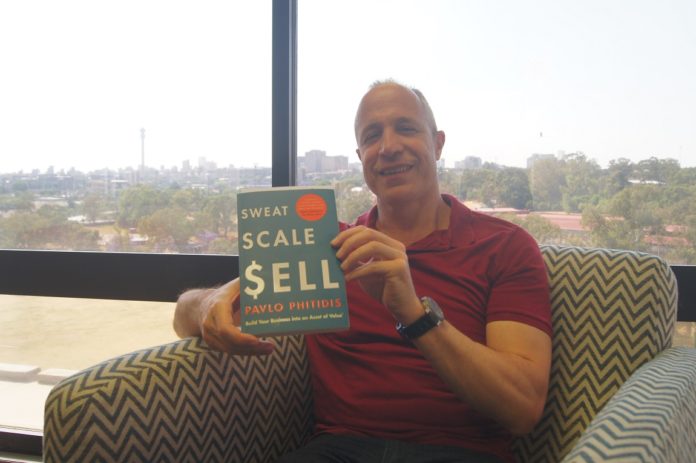Any listener of the business program on Radio 702 and Cape Talk will have heard of Pavlo Phitidis. Described as an “entrepreneurial and business growth content contributor” Phitidis has developed a practical approach to help people build “sellable” businesses. Using this extensive experience, Phitidis penned a book drawing on the success he’s achieved. The Daily Vox sat down with Phitidis to chat his book, Sweat Scale $ell, and more.
Phitidis begins his book with the story of his first client. He and his partner Carien Engelbrecht has just launched their business incubator company called Aurik Business Incubator. The first person to call them was a farmer from White River in Mpumalanga who wanted help incubating his chickens. Phitidis and Engelbrecht helped the farmer and earned their first paycheck.
It was at this point that Phitidis realised the South African market didn’t know anything about business incubation. After doing research and some failures, they realised the type of work they wanted to carry out.
“We decided that we were going to build a business to service for the established growth-orientated business owner. We then went underground. And for nine years we started, bought and sold 12 businesses to learn how to do this. It was expensive and valuable. Two businesses failed to and two listed on the Johannesburg Stock Exchange. Three were sold to management teams that bought the businesses and five were sold into corporate South Africa. From there, we suddenly understood how to start bold, grow, accelerate business in a very, very quick period of time.”
Having lived and learned in the United States (US), Phitidis said he expected to start a business incubation company in South Africa. These types of incubation and venture capitalist companies are popular in the US. However, leading on from that first experience the idea evolved.
“We’re not an incubator. We are an accelerator but not a startup accelerator. We’re an accelerator that focuses on growth for established businesses.”
The book’s filled with the real-life experiences of people running businesses and how Phitidis has helped them. However, his family ultimately inspired him to write the book. Phitidi comes from a family of entrepreneurs where his father, uncles and other family members all ran businesses.
“I come from a family of successful failed entrepreneurs. They started the business, they stayed with it. They invested heavily in their suppliers, in their staff, and in their customers. It was a very meaningful part of his world and life. And yet my uncle worked until he was in his late 80s and the other worked until he was 84. My father worked until he was about 78. And I was absolutely stunned that three men who did everything right had to carry on working because they had no choice. The businesses that they had created were unsellable.”
It is this idea that seems to lie at the heart of the work that Phitidis does. He works with businesses to ensure their success, but also to make sure that at the end of the day the business can be sold for a profit. At the heart of this work is the idea that businesses should exist for customers, not for employment.
“It’s really important that we note that the job of a business owner is not to create employment. The job of the business owner is to create a business that offers value to customers in such a way that customers will continue to support that business. Through that, the business owner can employ people who are deserving of the work to support the business’s performance, and continue that cycle of adding value to customers. Because if you don’t do that, you will not have a business. The role of the employee in that environment is to turn on and say, How do I make myself valuable to that business.”
As a final note, Phitidis said there’s an important thing to note about entrepreneurship which is often misunderstood.
“Entrepreneurship is misunderstood because entrepreneurship is two things. It’s a mindset and its action.
So should everyone be an entrepreneur? How can you not be an entrepreneur because what an entrepreneur does is looking at what works for them and what doesn’t? Think about it in your own personal life. Whatever you buy in your life solves a problem for you.
So if you wake up in the morning, and you experience a problem, and you look at the problem and say how many other people experience a problem? Suddenly, you start to realise that a lot of people experience a problem. An entrepreneurial mindset says I need to solve the problem for myself. Hopefully, through that, I can create a business that solves a problem for not only myself but for many other people.
So how can you live a life of being an entrepreneur. If you choose to put it into practice, that’s when you build the business. If you can’t afford to put it into practice, find a business that you think comes close to solving that problem and find employment there. In finding employment, you build a reputation, respect, insight, and skills.”
Published by Pan Macmillan, the book is available online and at all good bookstores.









